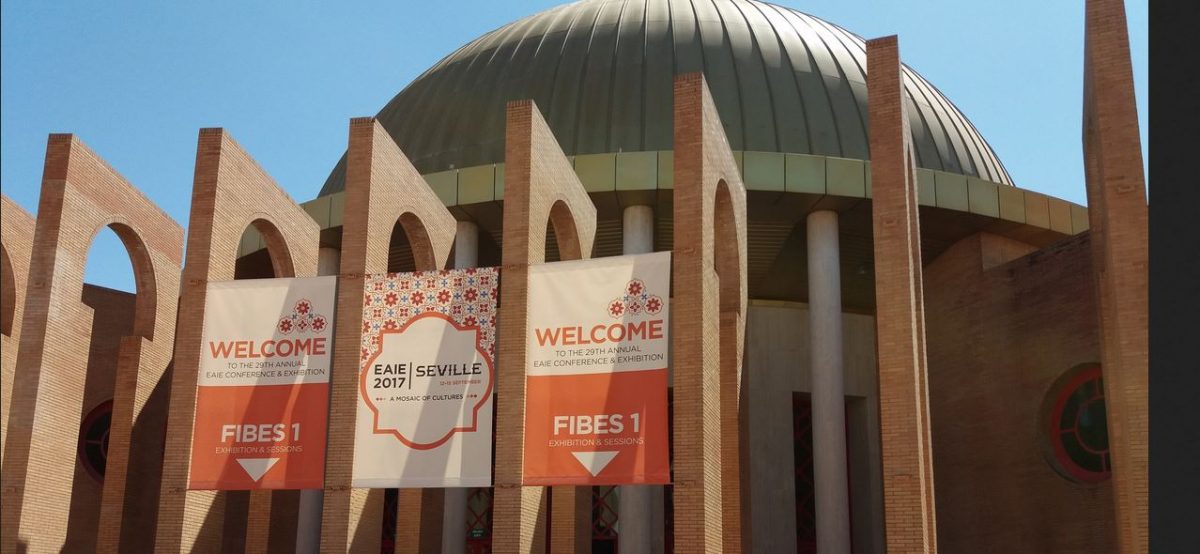
Internationalization is a common challenge to all Higher Education Institutions (HEIs) in Europe. The importance of welcoming the world to our institutions is unquestionable, being no more an option. Wanted or not, we’re heading for a vast and dynamic change. Actually, we are in the middle of it already. By being proactive, innovative and rapid, along with bold out-of-the-box thinking, we will succeed in this competition.
Institutional strategy defines processes and procedures during them. Internationalization (either emphasized or in minor role) is nowadays most likely one of the core actions in institutions offering higher education. As generally recognized, converting ambitious, strategy level goals and visions into concrete practice may appear a desperate job, with no clear priorities or starting points. Instead of just holding back (or on the other hand taking leaps too gigantic), the famous baby steps are needed. You just need to take them a lot, and now.
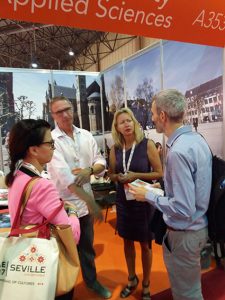
Over 6,000 international HEI experts from 95 different countries, enthusiastic to hear the latest news on the field of international education, participating sessions and workshops, greeting partners and networking – that’s what the recent conference of EAIE (European Association of International Education) was about in sunny Seville, Spain. In the time of digitalized communication, the joy of real human, face-to-face contact was tangible. During few hectic days, participants shared common issues and worries, as well as visions of co-operational possibilities, in a great mosaic of cultures. Here are some highlights of the participants of SAMK.
Tiina García: Embedded and cross-sectional internationalization, versatile marketing and lingua franca
Actions to develop internationalization must concern the entire organization and its mindset – it’s not just translating your websites or teaching in English.
Actions to develop internationalization must concern the entire organization and its mindset – it’s not just translating your websites or teaching in English. To create a holistic, international way to think and act, takes a deeper understanding of what internationality is about. In an educational context, this means not only pedagogical methods, but also management, research, projects, collaboration with industry and other stakeholders, administration, student support etc. We need to analyze all our functions with a loop of internationality: how sound are they really?
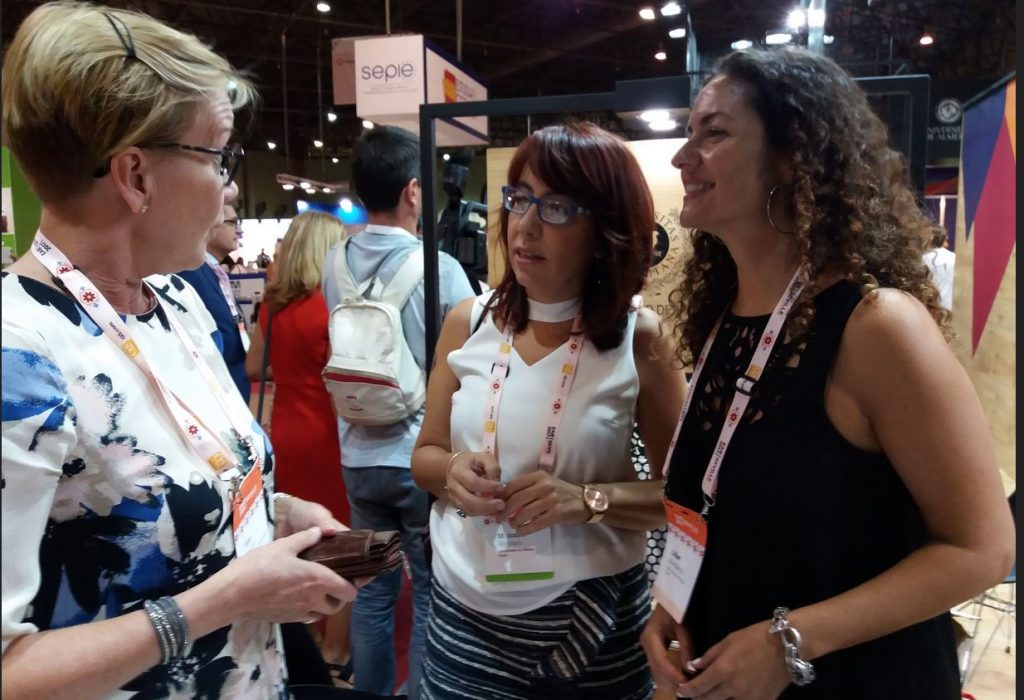
How do we let the world know of our existence? By diverse marketing. Our strengths usually are our best-selling points, and honesty plays essential role: rosy promises with a fragile bound to reality are doomed. Sure, we cannot change some less appealing facts, like harsh climate, high costs or remote location, but why not turn them into a positive experience and pull factors? Using references and testimonials of stakeholders, associations, partners, students, mayors or celebrities, more evidence and credibility is gained for international markets.
Using references and testimonials of stakeholders, associations, partners, students, mayors or celebrities, more evidence and credibility is gained for international markets.
Usually, internationalization in HEIs starts with incoming exchange students. In the world of higher education, the lingua franca is English. When applying English as a medium of instruction (EMI), there’s an enormous myth to break: teacher should speak perfect English. This, as said, is a myth, and here comes why: Teacher’s role is not to teach language itself, but to set an example for intercultural communication and international mindset. Surely a challenge that also needs open mind and positive thinking.
Marika Seppälä: Focus on the demands on engineering and engineers
Personally, the EAIE conference is always about sharing knowledge and ideas, empowerment by enthusiasm, partnerships and learning. Over the past years I have been privileged to attend this conference to maintain the partnerships and to consider our engineering education from a local and global perspective. This year I was able to host a session with a Belgian colleague Pina Cimino from PXL about the real-world demands on engineers. And why? Because looking at the job offers, engineering graduates are evaluated by a variety of skills, not only technical. How can an engineering programme ensure its graduates will meet the demands of the fast and changing labor market, when the majority of the universities still offer traditional technology-oriented education – that is the question. It is necessary to consider how to avoid overloading the curricula only with technical courses giving technical details, ignoring the employability skills. Now we are in the beginning of a process to start a network of interested colleagues from around the world to discuss and share ideas. Want to join?

Now we are in the beginning of a process to start a network of interested colleagues from around the world to discuss and share ideas. Want to join?
Alberto Lanzanova: Ideas, reflections and challenges: a foreigner’s view on internationalization
At first, as a newcomer to the EAIE conference, I felt overwhelmed by the massive amounts of people, thoughts and perspectives that such an event conveys. After sailing for a while – dazed and confused – in this endless sea of suggestions and views, I retrieved my compass and I found myself absorbed in a profusion of refreshing ideas.
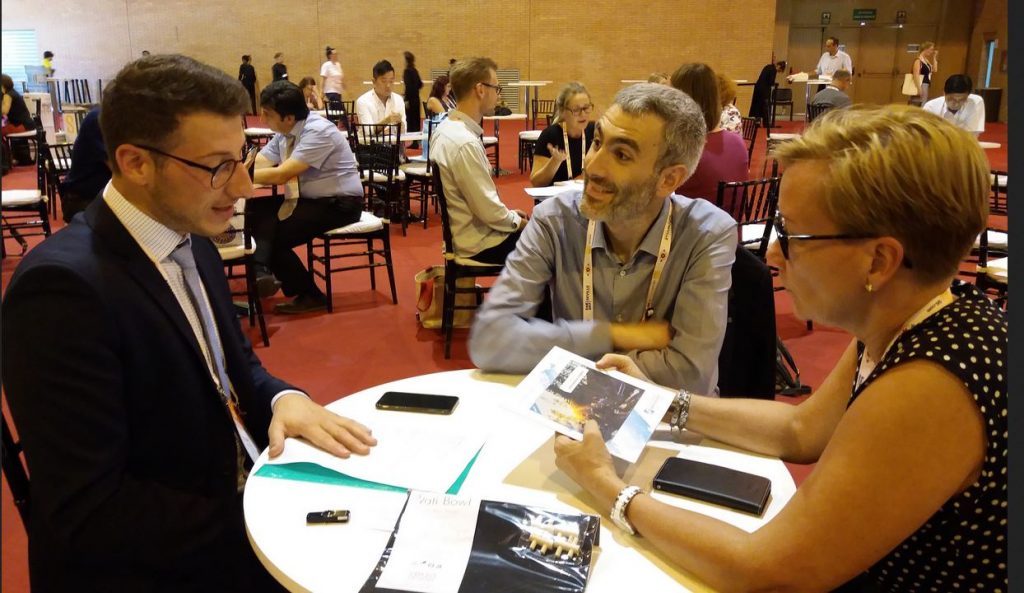
Because of the nature and importance of the education field we are working in, I believe it is wonderful – and at the same time crucial – to meet people from all around the world and discuss about common matters. By comparing how different organizations and cultures address similar issues, we can acquire new fundamental knowledge, be prepared to new challenges and, at the same time, set ourselves – as an institution – in an idealistic map that shows our place in the unrelenting internationalization process the world is going through.
After returning from the journey and some days of considerations, I think it is good to be back where the “real job gets done”. As an international member of SAMK’s staff, I reckon that an event like EAIE could carry a hidden drawback within it: all the people attending are somehow predisposed to international activities, projects and collaborations. Bearing in mind this, the risk is to end up in a Turris Eburnea, an Ivory Tower that functions and operates just within itself, but does not have a reflection on the real world.
In my opinion, here lays the ultimate challenge: transfer and fulfill in our own world what we have seen, discussed and argued about, despite adversities and bumps in the road.
In my opinion, here lays the ultimate challenge: transfer and fulfill in our own world what we have seen, discussed and argued about, despite adversities and bumps in the road. Of course, in order to work, this view should be embraced on all institutional levels, but probably we – as International Relations Office – should set the example and influence the decisions making process because of our background and history. Who else could step in?
Satu Schrey: Our role as an international educator is important
The conference is already over, but hopefully it left all the participants motivated to reach out and be the change – being aware even more than ever before that the work we do every day with the students will inspire them to do the same. Our role as an international educator is important: internationalization, all kind of mobility including different kinds of exchange programmes enable students to meet new people and new cultures, which removes many barriers and increases cross-cultural understanding.
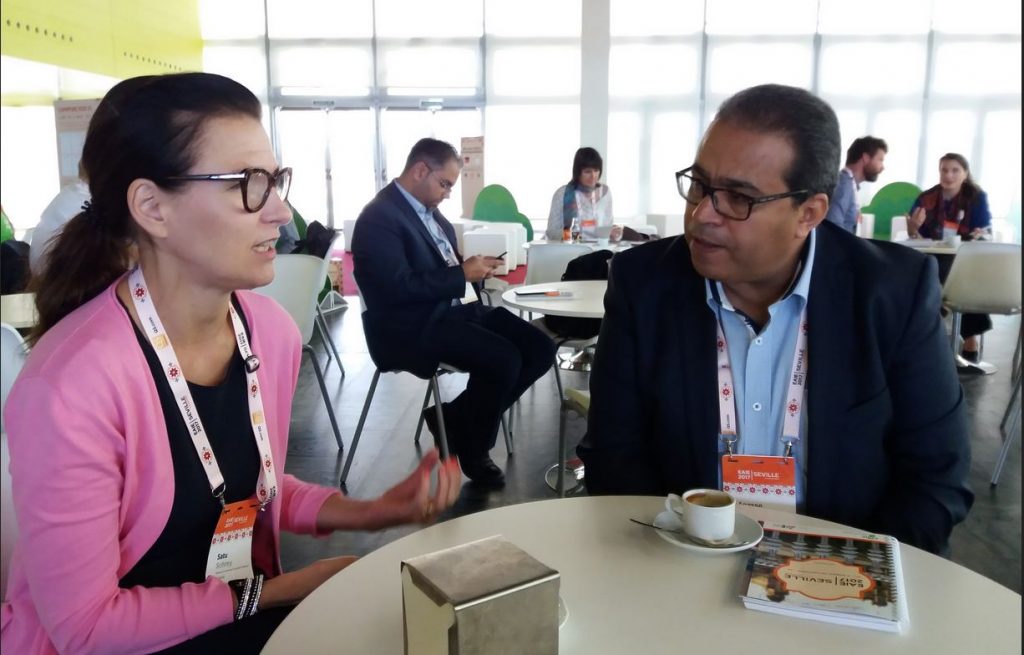
My main programme at the conference was to meet our partner universities’ representatives – just to discuss about e.g. the existing or potential cooperation, our partnership & agreements, and the new trends. The event – with more than 6 000 participants – gave me a chance to greet many other known colleagues, too, of course. In addition, I was proposed a couple of new interesting co-operation possibilities when exploring the exhibiting area thoroughly around – not to forget about many networking events during the week.
After attending a couple of sessions I know now something about the science of happiness: how to use positive psychology in international student guidance and another interesting session gave ideas for achieving better international engagement.
To sum up: Heavy schedule with many meetings plus interesting people in inspiring atmosphere. Felt so at home there again! <3
—
The writers participated the 29th Annual EAIE Conference and Exhibition in September 2017 at the Seville Conference and Exhibition Centre (FIBES), Spain.
Tiina García is a Senior Lecturer and Team Leader in Degree Programme in Tourism. Her responsibilities are team coordinating, curriculum design in the international project Boosted and IoC of the new international tourism study program ”International Tourism Development – Business and Wellbeing from Nature”, starting autumn 2018.
Marika Seppälä is a Senior Lecturer (Quality and Process Management, Management and Project Management), Team Leader of Energy and Environment as well as the faculty coordinator for international relations of the Faculty of Technology.
Satu Schrey works as an International Coordinator. Her responsibilities are Erasmus+ mobility agreements and general administration in student mobility.
Alberto Lanzanova works as International Relations Secretary and temporary Intercultural Communication teacher. Originally from Italy, his responsibilities concern student mobility, whereas his fields of interests are cultural studies and linguistics.
Interested to know more? Please contact the writer: firstname.surname@samk.fi